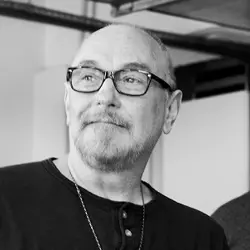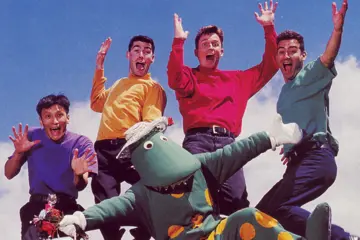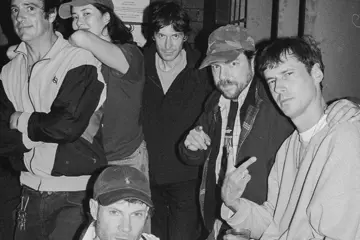 The Aints
The Aints“It was a fairly wacky concept in a lot of ways,” laughs Ed Kuepper of new project by his current project The Aints!, their fine long-player The Church Of Simultaneous Existence. That’s because the album’s source material dates back between 40 and 50 years, its origins tracing back at the earliest to when Kuepper was a high school student in Brisbane in the late-‘60s, through to when his pioneering rock band The Saints imploded in London at the tail-end of the ‘70s.
“I think one of the things that I really enjoyed from the outset was that everybody was sort of into it."
Some of the material had even been earmarked for a potential fourth album by the original incarnation of The Saints – who left three LPs behind after their all-too-brief tenure: (I’m) Stranded (1977), Eternally Yours (1978) and Prehistoric Sounds (1978) – but that record never saw the light of day as the band split asunder due to internal friction and external industry indifference. But while the material had lain dormant for all those years, its creator had never given up on it.
“I had a desire after completing [2015 solo album] Lost Cities,” Kuepper recalls. “The idea of going back and digging up some of this stuff had been around for a little while, it just seemed that The Aints! was a better way of actually looking at it than I’d thought before.
“The offer of touring The Aints! had come up [in 2017 for the 40th anniversary of (I’m) Stranded] and a lot of these old songs would come to me while I was doing something like walking around the streets, so it just seemed that there was this urgency to actually do something with them, and not just let them disappear.
Don't miss a beat with our FREE daily newsletter
“Because I’ve been doing this for so fucking long there’s a stack of material that hasn’t been recorded, and I guess I just wanted to start from the beginning. There are some things that even though I have some strange fondness for them, they’re probably not good enough to really do anything with, so they won’t see light of day. But with these songs, we introduced them into the set while we were playing, it started off with just four songs.
“Initially we had no intention to actually record it, we were basically just doing these shows, and I just thought it would be a really great thing to include a few songs which didn’t kind of make it onto records back in the day, totally with really hardcore fans in mind: not casual fans who probably know a handful of The Saints songs that are more well-known, but for people who actually know the albums – and know all the slightly more quirky stuff – to sort of complete the story in a way.”
It must be surreal on some level recording material written half a decade before: can Kuepper remember his mindset when creating the music or is it like working on someone else’s songs?
“It’s a combination of both. My mindset was: I just wanted to write songs – I just wanted to have a great rock’n’roll band and write pop songs,” he chuckles. “In some ways, it’s not more complex than that.”
Were the songs sitting there completed all this time or did they need some work?
“No, there’s been arranging, depending on which track,” Kuepper explains. “There’s a couple on there that are actually composites of two or three otherwise incomplete songs: it’s funny because it sort of sounds like it’s a contrivance, but that’s kind of how I write anyway. I put down a piece of music and then somehow blend it in with another piece of music that wasn’t necessarily written at the same time kind of thing.
“Something like Red Aces was originally a song without the horns, and then the horn thing came a couple of years later. So I can remember all that, I remember that incredibly clearly. There’s a horn section, for instance, in Goodnight Ladies (I Hear A Sound Without) which goes back to when I’d just started high school: it wasn’t originally a horn section, it was a vocal melody, but I thought it’d be nice as a horn section, that kind of thing.
“That goes right back to 1969! I guess I was just writing because that’s what I wanted to do – I didn’t want to be a fireman or anything, I just wanted to write songs,” the craftsman laughs gently recalling this youthful folly.
One of the hallmarks of The Church Of Simultaneous Existence is not just its overall consistency but its sonic diversity, featuring a pleasing range of tones amidst the up-tempo rock’n’roll, and Kuepper explains that this was by design to mirror The Saints’ thrilling early forays.
“All of the first three Saints records are totally different to each other, and that lies in the arrangement rather than the writing – that’s just the way things are played,” he tells. “And the way that’s worked out I could kind of do some of that material differently and it might sound like it came off the first album or something like that, or I could have made it a little more acoustic and made it sound like Prehistoric Sounds, but it needed to have its own identity.
“Actually [Kuepper’s first post-Saints band The Laughing] Clowns played some of this stuff, but we didn’t record it either. Stuff like You’ll Always Walk Alone was a real feature of The Laughing Clowns’ sets for ages.”
Apart from some early forays with The Aints in the ‘90s – and some brief Saints and Laughing Clowns reunions over the years – Kuepper has been largely working as a solo artist in recent times: has he enjoyed being back amidst a band dynamic again?
“Yeah, they’re quite different activities, aren’t they? And each has its pros and cons,” the singer laughs. “Some people seem to think that you need a lot of friction and tension and stuff to make a band work, but I’m not a believer in that – I actually kind of hate that. This band works without that: everyone’s really keen on doing their stuff and on enjoying the procedure, and we are.”
“The funny thing is that I’ve worked with [Sunnyboys bassist] Peter Oxley and I’ve worked with [pianist] Alister Spence before – they were involved when I was doing the [classic 1991 solo album] Honey Steel’s Gold Don’t Look Back [retrospective shows in 2008], but I haven’t worked with Eamon [Dilworth – trumpets] before and I haven’t worked with [Celibate Rifles/New Christs drummer] Paul Larsen before – Eamon was suggested by Alister and Paul was suggested by Peter – so I went with that line-up and I don’t regret it.
“So it’s a mixture of new and old but it wasn’t difficult to pull together. We had a run through after a chat and there just weren’t any issues right from the get-go.”
Larsen is a well-known Saints fan so he must be particularly enjoying the experience.
“Yeah, I know the bands he’s played in and we actually discussed how it needed to be different from The Celibate Rifles or from The New Christs, those sort of things,” Kuepper smiles. “This is a very distinctive kind of act in itself, and Paul does that almost seemingly without effort.
“I think one of the things that I really enjoyed from the outset was that everybody was sort of into it. Because there have been attempted sort of Saints reunions and various things and they’re always really fucking problematic and really difficult, and often times just outright pain in the ass material.
“And this wasn’t anything like that at all – everybody liked the material, and there wasn’t any ego distracting things. It was an absolute pleasure. He says, and in the next rehearsal will get into the fight and split up the band,” the singer guffaws. “But at the moment it’s all good.”
The band name The Aints was first used in anger back in the ‘90s: is it simply a flippant adjunct tracing back to The Saints, or is there actual acrimony that the band’s frontman Chris Bailey kept using The Saints moniker with a revolving line-up of musicians over the ensuing decades?
“I didn’t stop him, but I wished that he hadn’t,” Kuepper reflects ruefully. “It’s a complex story. We did discuss it, and my statement at the time was, ‘I don’t think it’s a great idea, but if you want to do that I don’t care.’
“I didn’t stop him, but I wished that he hadn’t.”
“When the original band split I was sort of feeling, I guess, a bit ambivalent about everything and was half-thinking of not continuing – maybe I was a bit depressed or a bit bleak – and I think in hindsight I wouldn’t have agreed to him doing that, but I didn’t stop him at the time so he has it.
“This band now is The Aints! with an exclamation mark, which is not just an affectation, it’s there to distinguish this band from The Aints that I had together in the early-‘90s: they’re completely different people and they’re doing a completely different thing.
“So it’s a different thing, but it links in in the same way that The Aints linked in with The Saints, and the fact that all these names rhyme and are simple to remember is a big part of it as well.”















